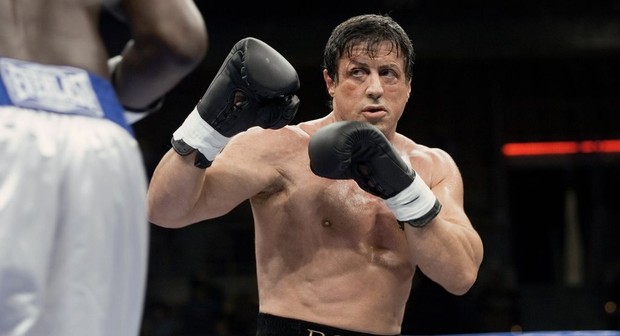Rocky Balboa (2006)
Rocky Balboa (2006), written and directed by Sylvester Stallone, is the heartfelt and inspirational sixth film in the legendary Rocky series. It marks the emotional return of boxing icon Rocky Balboa, decades after his prime, and serves as both a reflection on aging, loss, and legacy, and a reminder of the indomitable human spirit that made Rocky a symbol of perseverance.

The film opens years after the events of Rocky V. Rocky is now retired from boxing, living quietly in Philadelphia. His beloved wife Adrian has passed away from cancer, and her absence haunts him deeply. He runs a small Italian restaurant called Adrian’s, where he often tells nostalgic stories about his past fights to customers. Though outwardly calm, Rocky feels trapped by memories and loneliness. His son, Robert Jr. (Milo Ventimiglia), is distant and struggles to live in his father’s shadow, working a corporate job and avoiding his father’s public image.
Meanwhile, the boxing world has moved on to a new champion — Mason “The Line” Dixon (Antonio Tarver), a talented but arrogant fighter criticized for never having faced real competition. After a computer simulation broadcast by ESPN predicts that a young Rocky Balboa would defeat Dixon in his prime, the media and boxing promoters stir public interest in a possible exhibition match between the two.

Initially, Rocky dismisses the idea. However, a spark inside him begins to rekindle. Haunted by Adrian’s memory and feeling unfulfilled, Rocky undergoes a self-reflective journey. He reconnects with Marie, a woman he met decades ago in his neighborhood, and develops a paternal bond with her son, Steps. Their friendship brings warmth and purpose back into his life.
Driven by the need to prove to himself that he still has something left to give — not to win, but to stand tall again — Rocky applies for a boxing license. Despite skepticism due to his age, he trains relentlessly, channeling his grief and determination into every punch. The training montage — set to Bill Conti’s iconic “Gonna Fly Now” — symbolizes not only physical preparation but emotional healing.
The exhibition match is held in Las Vegas, with enormous fanfare. Though much older and slower, Rocky faces Mason Dixon with courage and heart. The fight is brutal, each round filled with punishing exchanges and moments of mutual respect. Despite suffering heavy blows, Rocky refuses to quit. His sheer willpower, discipline, and spirit earn the crowd’s admiration — even Dixon comes to respect him as a true warrior.
When the final bell rings, the judges award the victory to Dixon by split decision, but the real triumph belongs to Rocky. As the crowd chants his name, he raises his gloves in pride — not as a champion of the ring, but as a man who has conquered time, loss, and self-doubt.
The film closes with Rocky visiting Adrian’s grave, whispering softly, “Yo, Adrian, we did it.”
Rocky Balboa (2006) is a moving and powerful conclusion to a timeless saga — a story about resilience, love, and the strength to rise again, no matter how many times life knocks you down.



